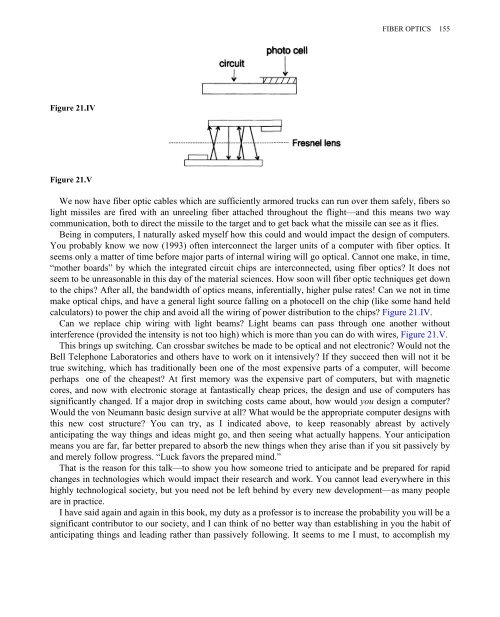hamming
hamming
hamming
You also want an ePaper? Increase the reach of your titles
YUMPU automatically turns print PDFs into web optimized ePapers that Google loves.
FIBER OPTICS 155Figure 21.IVFigure 21.VWe now have fiber optic cables which are sufficiently armored trucks can run over them safely, fibers solight missiles are fired with an unreeling fiber attached throughout the flight—and this means two waycommunication, both to direct the missile to the target and to get back what the missile can see as it flies.Being in computers, I naturally asked myself how this could and would impact the design of computers.You probably know we now (1993) often interconnect the larger units of a computer with fiber optics. Itseems only a matter of time before major parts of internal wiring will go optical. Cannot one make, in time,“mother boards” by which the integrated circuit chips are interconnected, using fiber optics? It does notseem to be unreasonable in this day of the material sciences. How soon will fiber optic techniques get downto the chips? After all, the bandwidth of optics means, inferentially, higher pulse rates! Can we not in timemake optical chips, and have a general light source falling on a photocell on the chip (like some hand heldcalculators) to power the chip and avoid all the wiring of power distribution to the chips? Figure 21.IV.Can we replace chip wiring with light beams? Light beams can pass through one another withoutinterference (provided the intensity is not too high) which is more than you can do with wires, Figure 21.V.This brings up switching. Can crossbar switches be made to be optical and not electronic? Would not theBell Telephone Laboratories and others have to work on it intensively? If they succeed then will not it betrue switching, which has traditionally been one of the most expensive parts of a computer, will becomeperhaps one of the cheapest? At first memory was the expensive part of computers, but with magneticcores, and now with electronic storage at fantastically cheap prices, the design and use of computers hassignificantly changed. If a major drop in switching costs came about, how would you design a computer?Would the von Neumann basic design survive at all? What would be the appropriate computer designs withthis new cost structure? You can try, as I indicated above, to keep reasonably abreast by activelyanticipating the way things and ideas might go, and then seeing what actually happens. Your anticipationmeans you are far, far better prepared to absorb the new things when they arise than if you sit passively byand merely follow progress. “Luck favors the prepared mind.”That is the reason for this talk—to show you how someone tried to anticipate and be prepared for rapidchanges in technologies which would impact their research and work. You cannot lead everywhere in thishighly technological society, but you need not be left behind by every new development—as many peopleare in practice.I have said again and again in this book, my duty as a professor is to increase the probability you will be asignificant contributor to our society, and I can think of no better way than establishing in you the habit ofanticipating things and leading rather than passively following. It seems to me I must, to accomplish my


